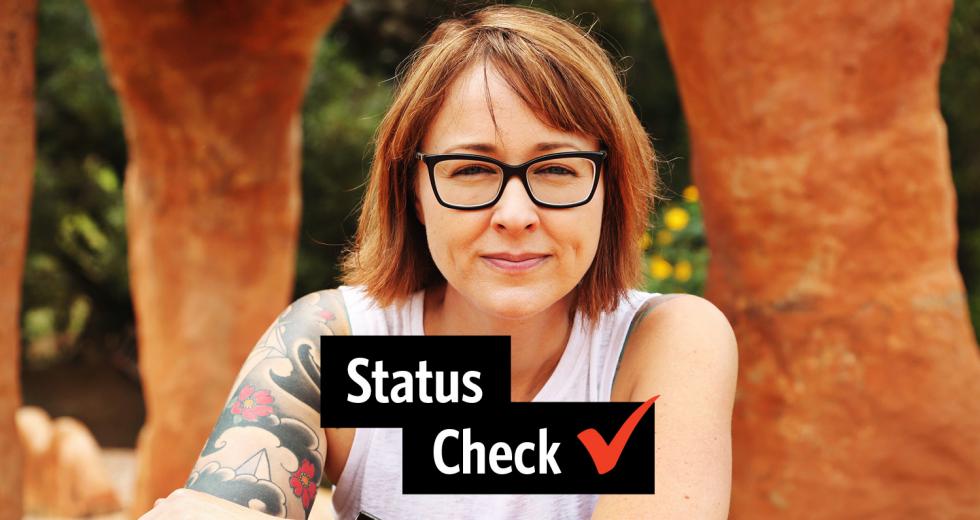A story about Liz Salmi in Comstock’s magazine (“An Open Book” in May 2017) ended on a hopeful note, with the long-term brain cancer patient quitting her job and flying to Austria to participate as a fellow in an annual conference on topics of global importance.
Just two years later, a life Salmi couldn’t have imagined when she received her diagnosis at 29 in 2008 continues to unfold.
“Things are great,” says Salmi, who celebrated her 40th birthday in July and lives in South Land Park with her husband, Brett Salmi, and cat, Mark Rothko. “Yeah. Busy, life is good. And if the question is about my health, that’s good.”
Diagnosed with gemistocytic astrocytoma grade II, described in the 2017 story as a “slow-growing but malignant form of brain cancer,” Salmi has come to terms with truths that might scare an everyday person, like the fact doctors will never give her a clean bill of health, or that, as she says, “this is something I live with as this ticking time bomb situation.”
Where others might give up, Salmi seems to be thriving. The original story noted her support for a nonprofit organization known as OpenNotes, which is leading the movement to enable medical patients to access notes written by their doctors, following each of their visits. Research has shown, Salmi says, that such information makes patients more likely to understand their diagnoses, have better relationships with their doctors and be more likely to take their medication as prescribed.
“Reading their notes, they actually feel like they have some kind of grasp on what they’re going through,” Salmi says.
Today, Salmi isn’t just an advocate for OpenNotes: After her trip to Austria in March 2017, Salmi says she returned with five job offers, opting to work remotely for Boston-based Beth Israel Deaconess Medical Center as senior multimedia communications manager and for OpenNotes as senior strategist.
In two years, Salmi has helped fuel rapid growth in her field, saying that at the time the article was written 14 million people in the United States had access to their digital doctors’ notes. Through her work, Salmi has helped disseminate OpenNotes research, going and talking to medical institutions (the organization does not sell any products).
“Now, we’re at a point where 40 million people in the country have access to their doctors’ notes as a result of talking about it a lot and going out and answering a lot of questions with the different hospitals and health systems,” Salmi says.
She says Sutter Medical Group enables patients to see their doctors’ notes and UC Davis Health plans to begin offering this service this fall. Kaiser Permanente and Dignity Health do not offer this service.
Salmi says she’s also in the process of applying for grant funding to lead one of her own research projects, consisting of qualitative analysis of survey data collected in 2017.
“I don’t have a Ph.D., I don’t have a master’s degree in any sort of sciences,” Salmi says. “But in the research dissemination side, where you talk about the research, I’ve learned a lot to a weird, interesting point where my bosses at OpenNotes have recognized that it’s something I’m really interested in and are starting to give me opportunities to participate in the actual research design process.”
Adam Hayden, a 37-year-old Indianapolis-based researcher who was diagnosed in 2016 with terminal glioblastoma multiforme, another type of brain cancer, knows Salmi through Twitter. “I think that Liz is really kind of a figurehead of this movement that patients aren’t just there to give their opinion once in awhile,” Hayden says. “But patients can really set a research agenda. And I think that Liz is using some of that skill with OpenNotes and the work that she’s doing.”
After two surgeries and two years of chemotherapy, Salmi still has brain cancer and always will, she says. But things are, at least relatively speaking, pretty good. A 2017 scan that she shared on Instagram showed a large black cavity where part of her tumor had been removed, with a smaller, adjacent bright white area where cancer remained.
Salmi has not had any surgeries in the past two years and gets a scan and evaluation every six months or so from her neuro-oncologist, who “gives me the thumbs up and a high-five and I leave. I’m doing very well.”
Salmi says some of the new experiences she’s had in the past few years have scared her “in that I don’t know if I’m prepared for it. But I just know, ‘Well, I’ve gone through crazier stuff. I can handle this, whatever it is.’”
—
Get this and other stories delivered to your inbox weekly: Sign up for our free email newsletter by clicking or tapping here.



